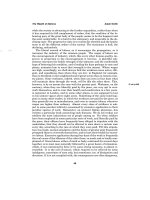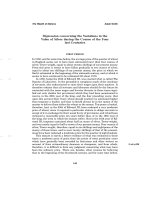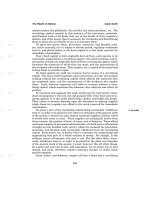An Inquiry Into The Causes And Costs Of Economic Growth: What Policy Makers Of Today Can Learn From The Muqaddimah Of Ibn Khaldun
Bạn đang xem bản rút gọn của tài liệu. Xem và tải ngay bản đầy đủ của tài liệu tại đây (3.89 MB, 114 trang )
INAUGURAL PROFESSORIAL LECTURE
AN INQUIRY INTO THE
CAUSES AND COSTS OF
ECONOMIC GROWTH:
W HA T POLICY MA KERS OF TODA Y CA N
LEA RN FROM THE MUQA DDIMA H OF IBN
KHA LDUN
Prof. Dr. Syed Omar Syed Agil
Razak School of Government
INTRODUCTION
• Economic growth has been a subject of debate and
controversy in the history of western economics.
• Research on economic growth has increased
tremendously in the past decade.
• However, we are also seeing economic welfare
declining globally.
• Governments and business find that the current
economic path is environmentally unsustainable.
OBJECTIVES OF THIS LECTURE
•To elucidate the theory of economic growth and costs of
economic growth in the Muqaddimah
•To set the record straight on the contribution of Ibn
Khaldun to the theory of economic growth and costs of
economic growth
•To contribute to the existing literature on the theory of
economic growth and costs of economic growth from the
perspective of Ibn Khaldun
•Remember, You and I are here
“to learn from each other”
ECONOMIC GROWTH PARADIGM
•
•
•
•
Economic growth is measured by real rate of growth in a
country's total output of goods and services or real GDP.
The paradigm states that the pursuit of economic
growth is a sole measure of national success
The western economic growth theories evolved from
Mercantilism, Physiocrates, Classical economics, Keynesians,
Neoclassical to modern theories.
Literature on the Benefits and costs of economic
growth(environment, global warming, consumerism, inflation,
inequality)
BENEFIT S OF ECONOMIC GROWTH IN WESTERN
LITERATURE
THE COSTS OF ECONOMIC GROWTH IN WESTERN
LITERATURE
THE COSTS OF ECONOMIC GROWTH IN WESTERN
LITERATURE
A DIVERGENCE OF THE GPI AND GDP WOULD SUGGEST THAT
ECONOMIC GROWTH IS COMING AT THE EXPENSE OF OTHER
CONTRIBUTORS TO WELL-BEING, SUCH AS ENVIRONMENTAL
QUALITY OR LEISURE TIME
published
by
the
State
• Report
Environmental Protection Agency (SEPA
) and the National Bureau of Statistics (
NBS) re-examines China’s 2004 GDP,
estimating that pollution cost the country
511.8 billion yuan (US$64 billion) in
economic losses that year, or 3.05 percent
of 2004’s total economic output
INITIATIVES RESULTED FROM THE
NEGATIVE EFFECTS OF ECONOMIC
GROWTH
QUICK SURVEY
How
many of you have
heard OR read about Ibn
Khaldun?
WHO WAS IBN KHALDUN?
• Born in 1332 in Tunis, North Africa and died in
1406 in Egypt.
• An outstanding 14th century scholar in various
branches of knowledge including philosophy of
history, historiography, education, political
economy and sociology.
• He came from an aristocratic family of scholars.
• He studied both religious and philosophical
sciences at an early age.
• A renowned public administrator and a Professor
dedicated to teaching and research.
POLITICAL CONDITIONS
The Islamic empire was in the stage of
senility
Internal threats due the political
upheavals and fragmentation within the
Islamic empire
Several rival dynasties emerged on the
North African coast.
External threats due to the encroachment
of the Mongols and the Christians
ISLAM AND TRADE IN NORTH
AFRICE
Islam came to North Africa when the Arabs from Arabia
conquered Egypt and later Spain.
From 8th to 9th century, the Spanish Muslim traders
converted the North Africans to Islam.
From North Africa, the Arabs spread Islam to West
African states through the salt-gold trade network.
Trade in Africa flourish with the advent of Islam which
triggered the process of urbanization.
Europe was a trading partner of Africa as they required
gold, the high quality textile and steel from Africa
Tunis became a well known trading and learning centre
Muslim traders from North Africa shipped goods
across the Sahara desert using large camel
caravans -- on average around a thousand
camels.
Caravan leaders and religious teachers spread
political, religious, and societal values to the
people along the trade routes
They brought in mainly luxury goods such as
textiles, silks, beads, ceramics, ornamental
weapons, and utensils. These were traded for
gold, ivory, woods such as ebony, and
agricultural products
To Egypt
From Hadramaut, Yemen
WHAT DID HE WRITE?
• Kitab Al-Ibar-The Book of History which consists
of 7 Volumes
• The Muqaddimah or also known as the
Prolegomena is the first volume and it is the
introduction to Kitab Al Ibar
• The Prolegomena alone contains more than 1,500
pages and it was written in just 5 months
• He also wrote his own biography or Al-Taarif bi
Ibn Khaldun.
WHAT ARE HIS GENERAL
CONTRIBUTIONS?
1. A precursor and forerunner of modern
historiography, economics, sociology, education
and political theories.
2. He studies the rise and decline of nations based on
empirical and rational nature of inquiry
3. He was the first to develop a scientific approach to
the study of human behavior, society and history
4. He discovers the theory of human social
development
WHAT THE WEST SAY
ABOUT IBN KHALDUN?
• In more than 1,000 years between the
times of the philosopher Aristotle in
ancient Greece and the writer Machiavelli
in Renaissance Italy, the most preeminent
social scientist was a Muslim Arab scholar
named Ibn Khaldun. He was a historian,
philosopher of history, and sociologist,
much of whose life was devoted to public
service and teaching (Encyclopedia
Britannica)
• It is true that Tacitus and
Thucydides lay much of the
groundwork of the science of
society. However, it is Ibn Khaldun
who makes the headway in turning
the study of society and history into
a scientific endeavor. If Thucydides
is the inventor of history, Ibn
Khaldun introduces history as a
science(Lakoste)









